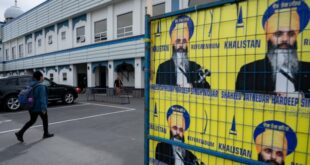More than 59% of voters rejected the proposal in early ballot counting

Advocates for constitutional change in Australia said they were devastated by the defeat Saturday of a referendum that would have created an advocacy committee to offer advice to Parliament on policies that affect Indigenous people, the nation's most disadvantaged ethnic minority.
More than 59 per cent of voters opposed Voice to Parliament, with almost half the votes counted by Saturday. The loss is unofficial but is not contested.
Prime Minister Anthony Albanese blamed his political opponents' campaigning against the measure for the failure. No referendum has ever succeeded without support of the major parties.
Albanese promised on the day he was elected last year to hold the referendum and accepted responsibility for his government's decision to proceed despite evidence it was doomed.
"I had a duty, as a conviction politician, to put that to the Australian people," he told reporters.
Bipartisan support is widely regarded as essential for an Australian referendum's success. Only eight of 45 referendums have succeeded in the constitution's 122-year history and none without the support of the major political parties.
Voice advocate Tanya Hosch, who spent a decade on developing the model, told ABC: "On a personal level, I feel devastated."
"There's going to be a lot of pain, and hurt and dismay, and we're going to need to take a moment to absorb that message and what it says," Hosch said.
Another advocate, Tom Mayo, said he was also devastated and blamed unfair attacks on the plan.
"We have seen a disgusting No campaign, a campaign that has been dishonest, that has lied to the Australian people," Mayo said.
Hope for better outcomes for Indigenous lives
Opinion polls in recent months indicated a strong majority of Australians opposed the proposal.
Earlier in the year, a majority had supported it, before the No campaign gathered intensity.
Voice advocates had hoped that listening to Indigenous views would lead to more effective delivery of government services and better outcomes for Indigenous lives.

Accounting for 3.8 per cent of the population, Indigenous Australians die on average eight years younger than the wider population, have a suicide rate twice that of the national average and suffer from diseases in the remote Outback that have been eradicated from other wealthy countries.
The Voice would have been the first referendum passed since 1977 and the first ever to pass without the bipartisan support of the major political parties.
*****
Credit belongs to : www.cbc.ca
 MaharlikaNews | Canada Leading Online Filipino Newspaper Portal The No. 1 most engaged information website for Filipino – Canadian in Canada. MaharlikaNews.com received almost a quarter a million visitors in 2020.
MaharlikaNews | Canada Leading Online Filipino Newspaper Portal The No. 1 most engaged information website for Filipino – Canadian in Canada. MaharlikaNews.com received almost a quarter a million visitors in 2020.







